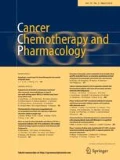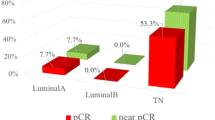Abstract
Purpose: Conventional chemotherapy for metastatic breast cancer results in very few long-term survivors. With a view to overcoming this problem, we hypothesized that a higher rate of complete response (CR) would lead to more long-term survivors. Therefore, we conducted a phase II study of epirubicin-containing high-dose chemotherapy (HDC) followed by autologous hematopoietic progenitor cell transfusion in patients who were sensitive to induction chemotherapy. Methods: The induction chemotherapy consisted of doxorubicin 60 mg/m2, cyclophosphamide 750 mg/m2 and fluorouracil 750 mg/m2 on day 1. Supported by G-CSF, this chemotherapy was repeated for at least three cycles at intervals of 2 weeks until the achievement of >50% tumor regression. The HDC comprised epirubicin 120 mg/m2 on day 1, cyclophosphamide 60 mg/kg on days 1 to 3 and thiotepa 6 mg/kg on days 1 to 3, followed by autologous bone marrow transplantation and peripheral blood stem cell transfusion. Results: Of 25 patients who achieved a partial response to the induction chemotherapy, 17 were treated with the HDC. Of the 15 patients evaluable for response, 10 achieved a CR (67%), giving an overall CR rate of 43% (10/25). The disease-free survival rate at 5 years was 27%. The median duration of overall survival was 21 months and the overall survival rate at 5 years was 31%. However, the survival curves were not significantly different from those of the historical controls who achieved a CR or PR to conventional chemotherapy. There were three early deaths, one as a consequence of disease progression and two treatment-related (sepsis and heart failure). Diarrhea (grade 3, 76%) and stomatitis (grade 3–4, 29%) were the dose-limiting toxicities. Conclusions: The present study suggests that epirubicin-containing HDC is able to induce a high rate of CR, but its benefit in terms of survival is still unclear. To determine whether HDC can achieve a cure in some patients, further studies in a larger number of patients, with a longer follow-up, are necessary.
Similar content being viewed by others
Author information
Authors and Affiliations
Additional information
Received: 23 February 1998 / Accepted: 13 May 1998
Rights and permissions
About this article
Cite this article
Ito, Y., Mukaiyama, T., Ogawa, M. et al. Epirubicin-containing high-dose chemotherapy followed by autologous hematopoietic progenitor cell transfusion for patients with chemotherapy-sensitive metastatic breast cancer: results of 5-year follow-up. Cancer Chemother Pharmacol 43, 8–12 (1999). https://doi.org/10.1007/s002800050856
Issue Date:
DOI: https://doi.org/10.1007/s002800050856




